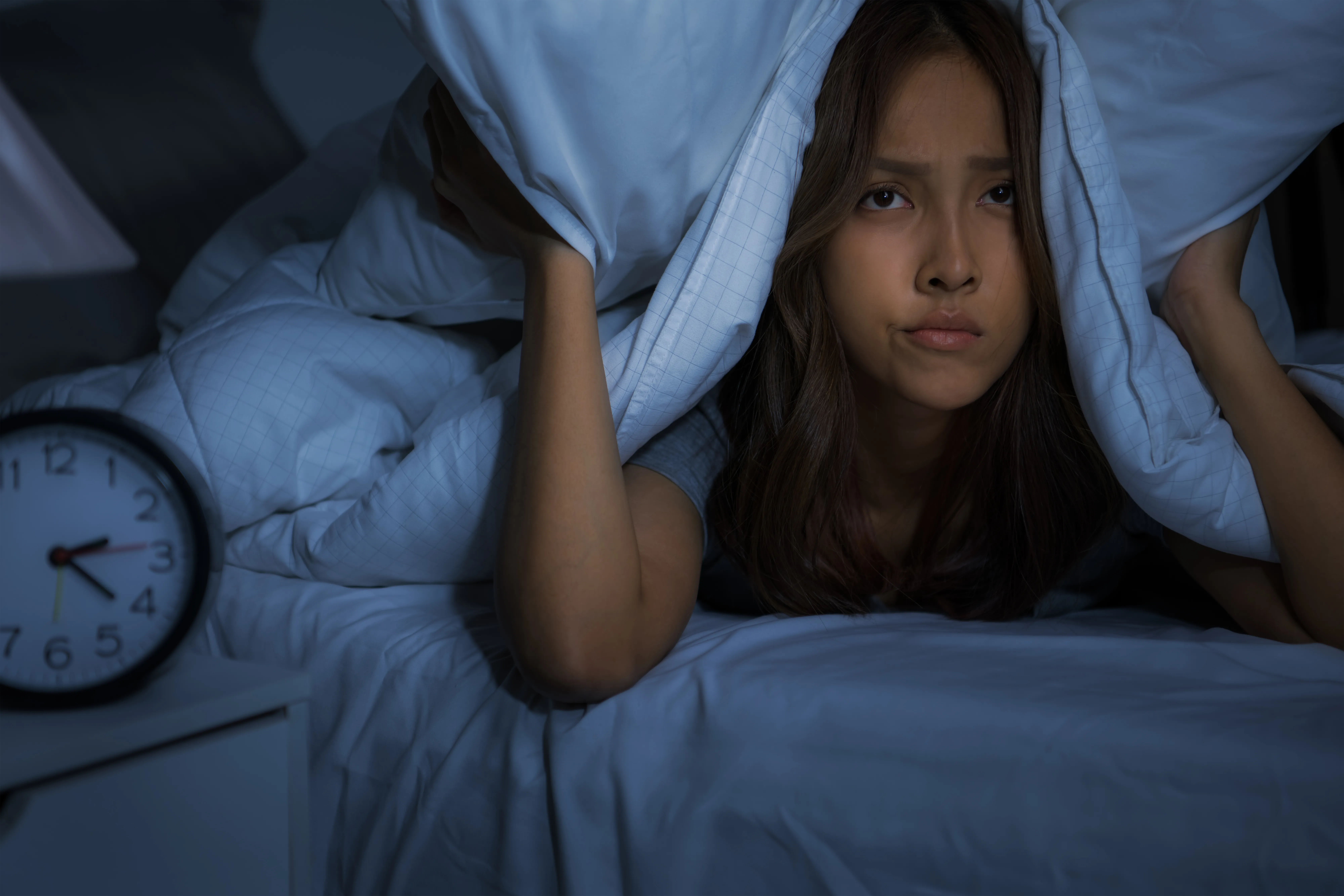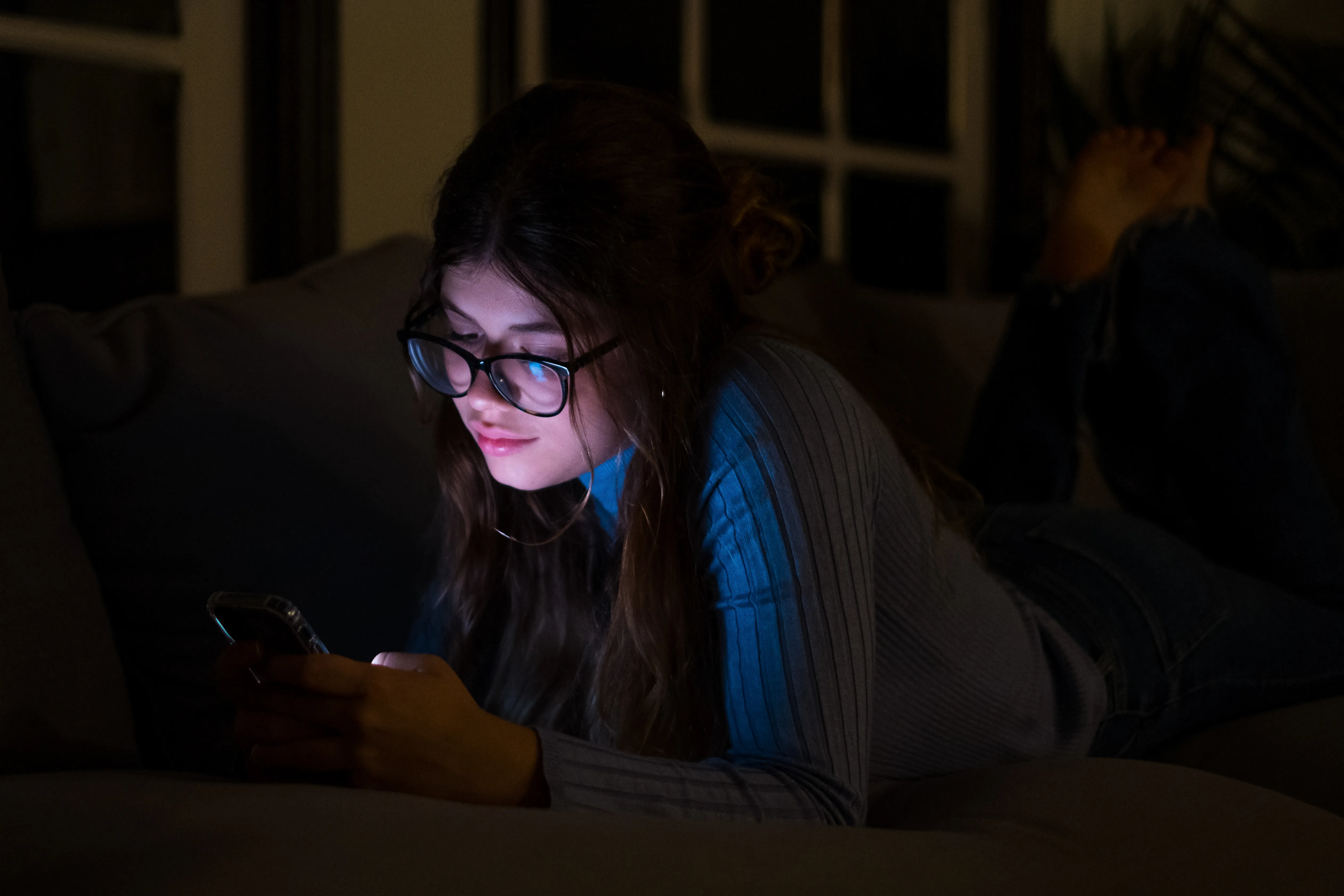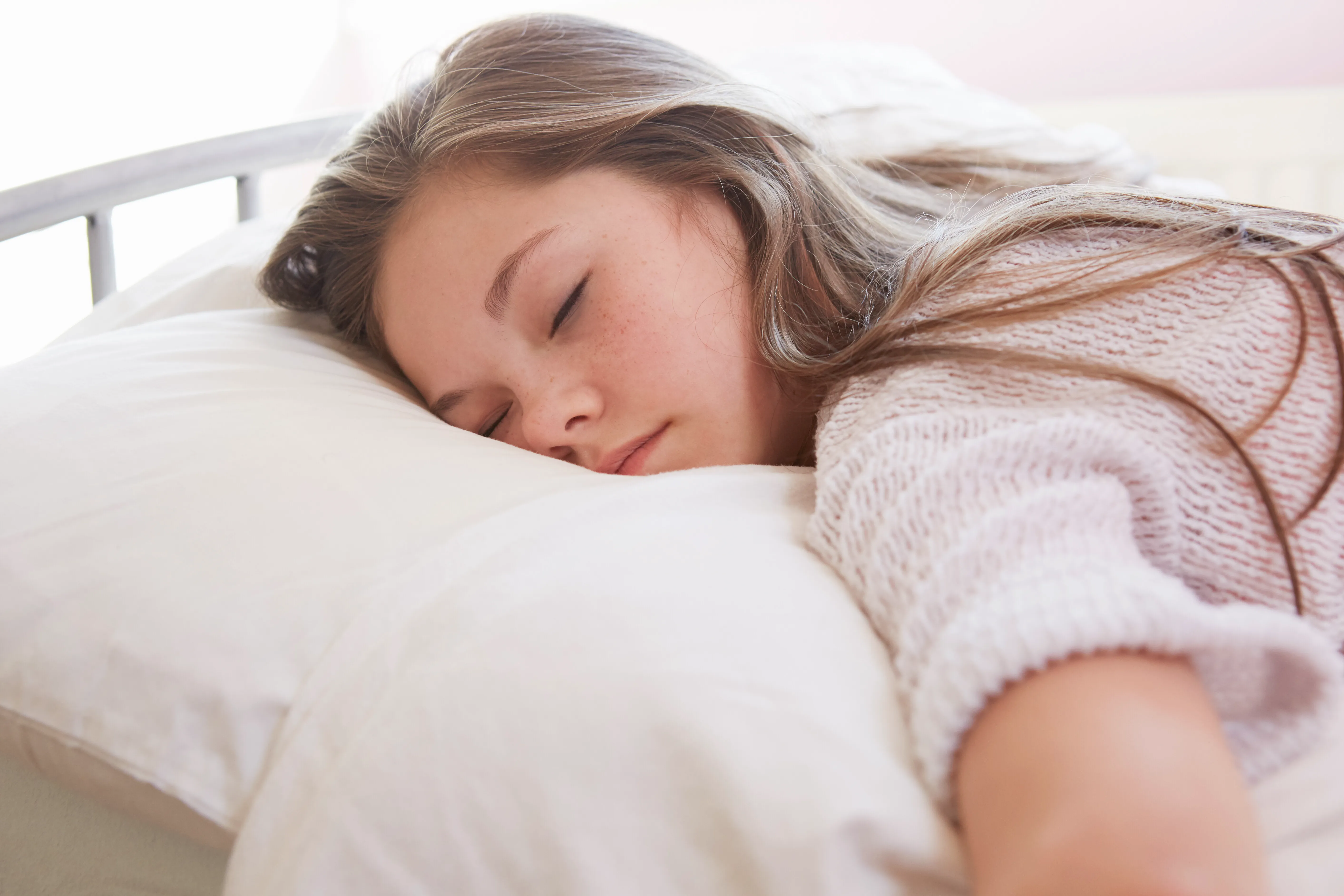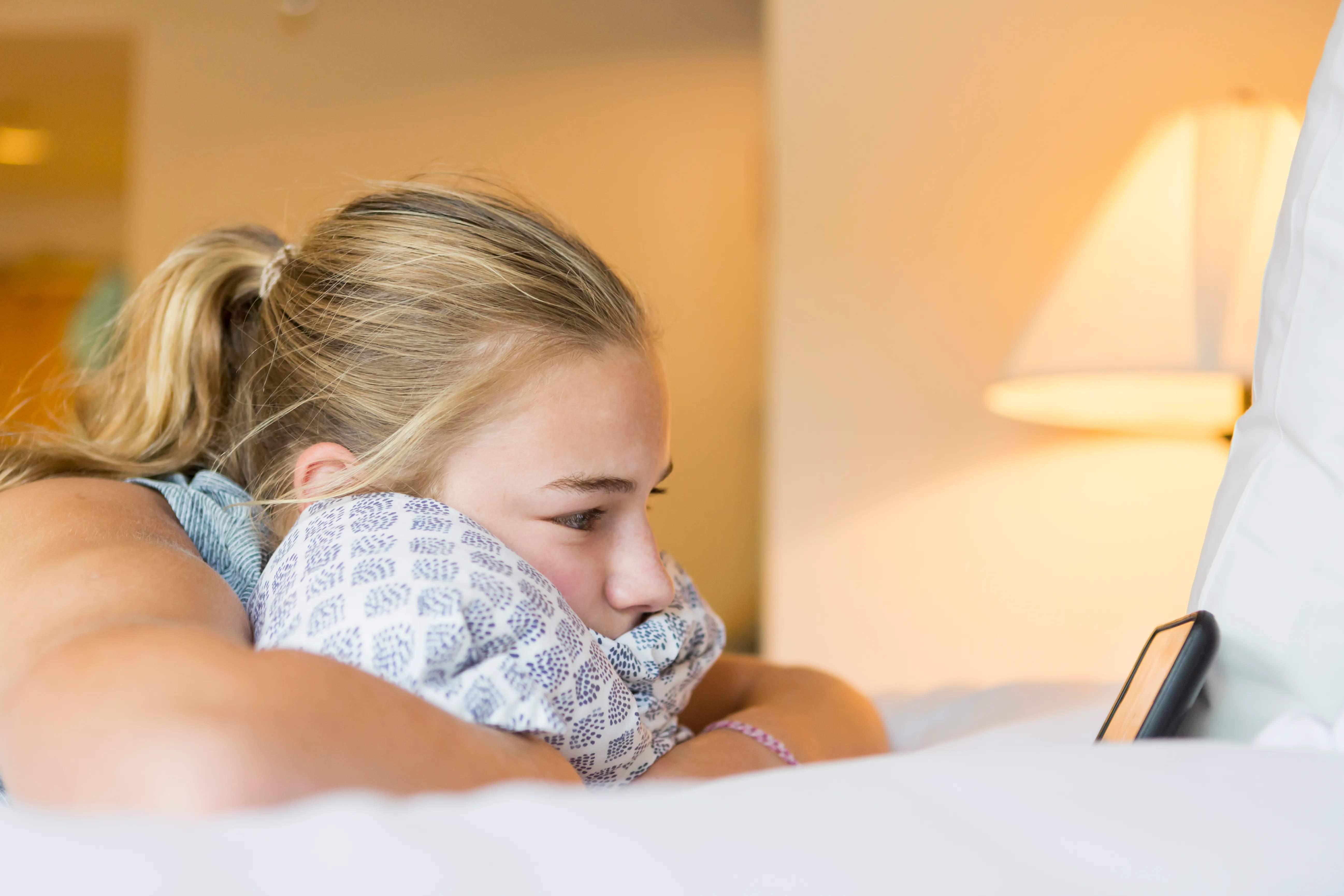In today's digital age, the importance of sleep for teenagers cannot be overstated. Adequate sleep is crucial for their physical health, cognitive development, and emotional well-being.
However, increasing screen time has emerged as a significant contributor to insomnia among teens. The blue light emitted by smartphones, tablets, and computers interferes with the body's natural circadian rhythms, making it difficult for adolescents to fall asleep.
In this article, we will take a deeper look at the connection between sleep and screen time, as well as how sleep deprivation can negatively affect the physical and mental well-being of teenagers.
Understanding Insomnia in Teenagers

Teen insomnia is a growing concern that warrants attention due to its potential impact on physical health, academic performance, and emotional well-being.
By understanding and addressing the challenges that accompany insomnia early on, we can help teenagers achieve better sleep hygiene and overall health.
What is insomnia?
Insomnia is a sleep disorder characterized by the persistent difficulty in falling asleep or staying asleep, despite having the opportunity to sleep. This condition can lead to significant impairments in daytime functioning and overall well-being.
Common symptoms of insomnia include trouble initiating sleep, frequent awakenings during the night, waking up too early, and feeling unrefreshed upon waking. Individuals may also experience irritability, fatigue, and difficulty concentrating throughout the day.
Insomnia can be acute or chronic and may result from various factors, including stress, anxiety, medical conditions, or lifestyle choices. Addressing insomnia is essential for maintaining optimal health.
Know more about How Insomnia is Diagnosed.
How common is it among teens?
Insomnia is increasingly recognized as a common issue among teenagers. approximately 15-20% of adolescents experience chronic sleep disturbances, leading to difficulties in concentration, mood swings, and academic performance.
Causes of Insomnia in Adolescents
Insomnia, characterized by difficulty falling asleep or staying asleep, is a condition increasingly prevalent among adolescents. Understanding the causes of insomnia in this demographic is crucial for effective intervention and management.
- Delay in Circadian Rhythms: One significant contributor is the shift in biological sleep patterns that occurs during puberty. Adolescents experience a natural delay in their circadian rhythms, which can lead to a mismatch between their internal biological clocks and the external demands of school schedules. This misalignment often results in insufficient sleep duration, contributing to insomnia.
- Screen Time: The blue light emitted by screens interferes with melatonin production, the hormone responsible for regulating sleep-wake cycles. As adolescents frequently engage with their devices late into the night, this exposure not only delays sleep onset but also leads to poor sleep quality. Furthermore, the compulsive nature of social media can result in heightened anxiety and stress levels, further exacerbating insomnia symptoms.
- Academic Pressure: The pursuit of academic excellence can lead to excessive stress and anxiety, making it difficult for students to unwind and fall asleep. Prolonged study hours and extracurricular commitments leave little room for relaxation, leading to an overactive mind at bedtime. This mental hyperarousal can prevent adolescents from achieving the restful sleep necessary for their growth and development.
- Family Dynamics: Households characterized by conflict, instability, or inconsistent routines can create an environment that disrupts healthy sleep patterns. Adolescents may find it challenging to cope with emotional turmoil at home, which can manifest as difficulty in initiating or maintaining sleep.
How Screen Time Disrupts Teen Sleep

In today's digital age, the pervasive use of screens has emerged as a significant factor disrupting sleep patterns among teenagers. With the advent of smartphones, tablets, and other digital devices, adolescents find themselves increasingly engrossed in online activities that stretch late into the night.
Addressing this issue is crucial for promoting healthier sleep habits and supporting the emotional well-being of teenagers in an increasingly digital world.
Blue Light Exposure
One of the primary concerns is blue light exposure, which emanates from smartphones, tablets, and computers. This type of light interferes with the production of melatonin, a hormone that regulates sleep.
As teens engage with screens before bedtime, their bodies struggle to transition into a restful state, leading to difficulties in falling asleep and achieving restorative sleep cycles.
Brain Stimulation
The brain stimulation caused by engaging content, such as social media, video games, or streaming services, can further exacerbate sleep disturbances.
The excitement and emotional responses elicited by these activities keep the brain active and alert, making it challenging for teens to unwind.
As a result, many adolescents face sleep deficits, which can lead to a host of negative outcomes, including poor academic performance, mood disturbances, and impaired cognitive function.
Notifications and Sleep Interruptions
The constant barrage of notifications and sleep interruptions from electronic devices can lead to heightened alertness, making it difficult for teens to wind down.
This prolonged engagement with screens not only delays bedtime but also reduces the overall quality of sleep, resulting in fatigue and decreased academic performance.
Emotional Impact
The emotional impact of screen time on teen sleep is a growing concern among parents, educators, and mental health professionals. As adolescents increasingly engage with digital devices, the negative consequences on their sleep patterns are becoming more apparent.
- Stress and Anxiety: The emotional impact of disrupted sleep due to screen time is profound. Insufficient sleep is closely linked to heightened levels of stress and anxiety, making it challenging for teenagers to cope with daily pressures. The resulting fatigue can lead to difficulties in concentration, academic decline, and increased irritability.
- FOMO: The relationship between screen time and emotional well-being is further complicated by the phenomenon known as FOMO, or the "fear of missing out." Social media platforms often amplify this feeling, as teens are constantly bombarded with images and updates from their peers. The pressure to remain engaged and informed can lead to prolonged screen usage, particularly during nighttime hours. As adolescents scroll through posts, seeking validation and connection, they inadvertently sacrifice precious hours of sleep.
- Cycle of Dependence: The compulsive nature of social media and gaming can create a cycle of dependence, where teens find themselves prioritizing screen time over restorative sleep.
How long should teens sleep?
In today's digital age, determining how much screen time is too much for teens has become a significant concern for parents, educators, and health professionals alike.
It is suggested that children and adolescents aged 5 to 18 should limit their recreational screen time to no more than two hours per day. This recommendation aims to strike a balance between the benefits of technology, such as educational resources and social connectivity, and the potential negative consequences associated with excessive screen use, including sleep disturbances, decreased physical activity, and mental health issues.
Know more about How Much Sleep a Teenager Should Get.
Symptoms of Sleep Deprivation in Teens

As adolescents undergo crucial developmental changes, the need for adequate sleep becomes paramount. A lack of sufficient rest can lead to a myriad of symptoms, which affect their daily functioning and have long-term consequences on their academic performance and emotional health.
Academic Performance Decline
Sleep plays a critical role in cognitive functioning processes such as memory consolidation, attention, and problem-solving abilities.
When teenagers do not get enough sleep, they often find it challenging to concentrate in class or retain information, leading to poor grades and a lack of motivation.
This decline in academic performance can lead to a vicious cycle, where an increase in stress levels exacerbates sleep issues.
Mood Swings
Insufficient sleep can lead to irritability, mood instability, and increased emotional sensitivity. Teens may find themselves experiencing heightened frustration or sadness over minor issues.
These mood fluctuations can strain relationships with peers and family members, contributing to feelings of isolation and loneliness.
Over time, these emotional challenges can escalate into more serious mental health issues such as depression.
Know more about Teen Depression and How it Affects Sleep.
Weakened Immunity
Chronic sleep deprivation may weaken the immune system, making teenagers more susceptible to illness. During sleep, the body engages in vital restorative processes that bolster immune function.
When teens sacrifice sleep for academic demands or social activities, they compromise their body's ability to fend off infections and recover from illness.
This weakened immunity not only affects their physical health but can also further hinder their academic performance and emotional stability.
Persistent Fatigue
Persistent fatigue is a hallmark symptom of sleep deprivation that can significantly impact a teenager’s daily life.
Teens may struggle to get out of bed in the morning, feel lethargic throughout the day, and require excessive caffeine consumption to stay alert.
This constant state of tiredness can hinder their ability to engage in extracurricular activities or socialize with friends, leading to a diminished quality of life.
Delayed Growth
Sleep deprivation can also delay growth during this critical developmental stage. The majority of physical growth occurs during sleep due to the release of growth hormones.
Insufficient rest can disrupt this process, potentially leading to stunted growth and affecting overall physical development.
For teenagers who are already navigating the challenges of adolescence, this added concern can be particularly distressing.
Tips to Reduce Screen-Related Sleep Disruption
As we continue to navigate our screen-filled lives, it is imperative to take proactive measures toward safeguarding our sleep and ensuring we wake up refreshed and ready to face each day.
Reducing screen-related sleep disruption involves a multi-faceted approach. by implementing some strategies, individuals can significantly improve their sleep quality and overall well-being.
Prioritizing healthy sleep habits enhances daily functioning and contributes to long-term health benefits.
Set a Digital Curfew
One effective method to improve sleep hygiene for teens is to set a digital curfew. By establishing a specific time in the evening to disconnect from all screens, individuals can create a buffer period that allows their minds and bodies to unwind before bedtime.
These practices limit screen time before bed and encourage the production of melatonin, the hormone responsible for regulating sleep, and ultimately lead to more restorative rest.
Use Night Mode or Blue Light Filters on Devices
Utilizing night mode or blue light filters on devices can also contribute to reducing screen-related sleep disruption. Many smartphones, tablets, and computers now offer features that adjust the display settings to minimize blue light exposure during the evening hours.
By activating these settings, users can significantly diminish the stimulating effects of screens on their circadian rhythms. This adjustment can help create a more conducive environment for sleep, as the warmer tones emitted during nighttime hours are less likely to interfere with the body’s natural sleep-wake cycle.
Remove Screens From the Bedroom Altogether
The bedroom should be regarded as a sanctuary for rest and relaxation; therefore, keeping electronic devices out of this space can help establish a more serene environment.
By creating a screen-free zone, individuals are less likely to be tempted by notifications or the urge to check social media before bed.
This not only fosters better sleep hygiene but also helps reinforce healthier habits and boundaries regarding technology use.
Follow a Healthy Wind Down Routine Before Bed
Following a healthy wind-down routine before bed plays a crucial role in promoting restful sleep. Engaging in calming activities such as reading a book, practicing mindfulness or meditation, or enjoying a warm bath can signal to the body that it is time to transition into sleep mode.
Establishing a consistent pre-sleep routine can enhance relaxation and prepare both the mind and body for rest. Incorporating activities that do not involve screens allows for a more peaceful end to the day, fostering a sense of tranquility that is conducive to falling asleep faster and achieving deeper sleep.
When to Seek Professional Help
Recognizing when to seek professional help regarding teenage insomnia is vital for promoting healthy sleep patterns and overall mental health in adolescents.
Early intervention can lead to effective treatment strategies that not only alleviate insomnia but also address any underlying issues contributing to sleep disturbances.
If Sleep Problems Persist Despite Good Habits
While it is not uncommon for teenagers to experience occasional sleep disturbances due to various factors such as stress, hormonal changes, or lifestyle habits, it becomes a concern when these sleep problems persist despite adopting good sleep hygiene practices.
Good habits include maintaining a consistent sleep schedule, creating a relaxing bedtime routine, and minimizing exposure to screens before bedtime. When these strategies fail to yield significant improvements in sleep quality, it may be time to seek professional help that can provide guidance and strategies, such as Cognitive Behavioral Therapy (CBT), for managing the negative impact of insomnia.
Signs of Sleep Disorders or Tech Addiction
If the insomnia is coupled with other troubling signs such as anxiety or depression, it is crucial to address these concerns with a healthcare provider. A thorough assessment can help determine if there are underlying sleep disorders, such as insomnia, restless leg syndrome or sleep apnea, that require specific treatment.
Another contributing factor to teenage insomnia could be tech addiction. The pervasive use of smartphones and other electronic devices has been linked to disrupted sleep patterns among adolescents. If parents notice that their teenager exhibits symptoms of tech addiction, such as an inability to limit screen time or feelings of anxiety when not using devices, it may exacerbate existing sleep issues.
FAQs
Can screen time before bed really cause insomnia?
Excessive exposure to screens, especially before bedtime, can disrupt the body's natural circadian rhythms and cause insomnia in teens. The blue light emitted by devices inhibits melatonin production, a hormone crucial for sleep regulation.
How long before bed should you turn off electronics?
When to stop screen time before bed depends on multiple factors; however, it is typically around 1 to 2 hours prior to sleep. This allows the body to naturally wind down and prepares the mind for rest.
Does using “night mode” or blue light filters help teenagers sleep better?
Yes, by utilizing night mode or blue light filters, teenagers may reduce this exposure, thereby promoting healthier sleep patterns. However, while these tools can be beneficial, they should not replace good sleep hygiene practices.
Is it okay for teens to use screens to watch ASMR before bed?
While ASMR can promote relaxation and improve sleep quality, it is essential to consider the potential drawbacks of screen exposure before bedtime, which include the blue light exposure from the devices that can disrupt the body's natural circadian rhythm.
How much sleep do teens really need?
Teens typically require between 8 and 10 hours of sleep each night to support their physical, cognitive, and emotional development.
Should screens be removed from the bedroom completely?
It is recommended to remove screens from the bedroom completely, as it will create a screen-free zone, and individuals may experience reduced distractions and enhanced relaxation, which will foster a more conducive environment for restful sleep.
Conclusion
The relationship between screen time and insomnia among teens is a growing concern that warrants attention. Excessive screen time, particularly before bedtime, can disrupt sleep patterns and contribute to insomnia.
Parents and educators should encourage healthier screen habits, such as limiting usage in the evening and promoting alternative activities.
By fostering awareness and implementing strategies to reduce screen time, we can help mitigate insomnia and promote better sleep hygiene among adolescents, ultimately supporting their overall well-being.
Dom Abraham
As the lead content writer at Sleepiverse. Dom pours his heart into writing mattress reviews, bedding product reviews, and medically-reviewed health articles. Dom is from Portugal and likes to spend his free time writing on the beach as it gives him a sense of comfort. Aside from writing mattress reviews in front of the soothing beach view, Dom likes to experiment with new amazing food ideas.


